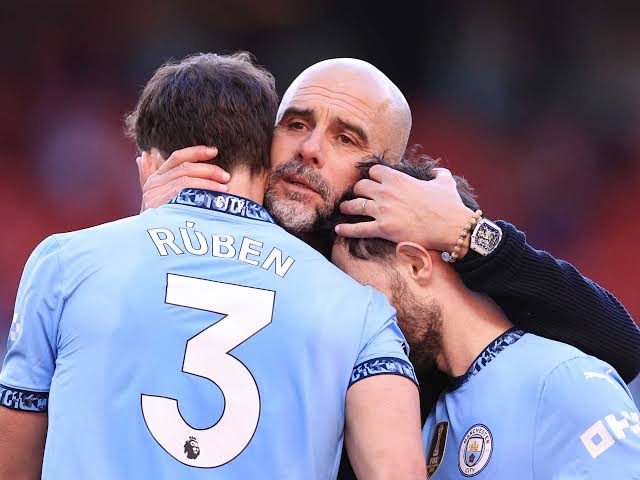UEFA rule might force Man City hand in City Star transfer decision

Manchester City find themselves in a precarious position as they prepare for the 2025/26 season, caught between Pep Guardiola’s desire for a streamlined squad and the rigid squad registration rules imposed by UEFA for Champions League participation. The recent speculation surrounding Nico Gonzalez’s potential departure after just six months at the Etihad Stadium represents more than just a simple transfer story – it illuminates the complex web of regulations that govern modern football and the strategic decisions clubs must make to remain competitive at the highest level.
The situation at Manchester City serves as a microcosm of the broader challenges facing elite European clubs in the modern era. Squad registration rules, designed to promote homegrown talent and maintain competitive balance, have instead created a labyrinthine system that often forces clubs into making decisions that may not align with their sporting ambitions. For City, these rules have created a perfect storm of circumstances that could see promising talents like Gonzalez sacrificed on the altar of regulatory compliance.
To understand the gravity of Manchester City’s predicament, one must first comprehend the intricacies of UEFA’s squad registration rules. These regulations, established to encourage the development of homegrown talent and maintain a connection between clubs and their local football communities, have far-reaching implications for squad construction and transfer strategy.
Under UEFA’s current framework, each club participating in the Champions League must register a squad of no more than 25 players for the competition. This limitation alone presents challenges for clubs with deep squads, but the complexity extends far beyond simple numerical restrictions. The rules stipulate that eight of these 25 positions must be reserved for players who have been trained within English football for three full seasons between the ages of 15 and 21. This category, known as “homegrown players,” is further subdivided into two groups: four players must have spent those three crucial developmental years at the club itself, while the remaining four can have received their training at any English club.
The implications of this structure are profound. In practical terms, it means that Manchester City can only register 17 “foreign” players – those who don’t meet the homegrown criteria – for Champions League participation. This restriction creates a bottleneck that becomes increasingly problematic as clubs seek to maintain competitive squads across multiple competitions while adhering to regulatory requirements.
The rationale behind these rules is theoretically sound. By incentivizing the development of local talent, UEFA aims to preserve the cultural identity of clubs and ensure that the benefits of football’s commercial success filter down to grassroots development. However, the practical implementation of these rules often creates unintended consequences, forcing clubs to make decisions that may not serve their sporting interests or, paradoxically, the development of young players.
Manchester City’s current predicament stems from a fundamental mismatch between their squad composition and UEFA’s registration requirements. According to recent analysis, Guardiola currently has 21 players who would be classified as “foreign” under UEFA’s criteria, creating a significant overage that must be addressed before the start of the Champions League campaign.
The mathematical reality is stark: with only 17 slots available for foreign players, City must either sell, loan, or exclude four players from their Champions League squad. For a manager like Guardiola, who has repeatedly expressed his reluctance to leave players out of squads, this represents a nightmare scenario that goes against his fundamental coaching philosophy.
The list of affected players reads like a who’s who of international football talent. Ederson and Stefan Ortega represent two of the world’s finest goalkeepers, while the defensive contingent includes players like Ruben Dias, Josko Gvardiol, and Manuel Akanji – all of whom would be considered essential to any elite squad. The midfield and attacking options are equally impressive, featuring established stars like Rodri, Bernardo Silva, and Erling Haaland, alongside promising talents such as Savinho and Rayan Cherki.
This embarrassment of riches, while enviable from a sporting perspective, creates an administrative headache that threatens to undermine City’s Champions League ambitions. The prospect of leaving world-class players out of the squad for eight Champions League matches represents not just a waste of talent, but a potential source of dressing room discord and a competitive disadvantage in Europe’s premier competition.
Compounding City’s foreign player surplus is the potential exodus of homegrown talent that would normally help balance the squad composition. Kyle Walker’s recent move to Burnley has already removed one valuable homegrown option, while the futures of Kalvin Phillips, James McAtee, and Jack Grealish remain uncertain.
The loss of these players creates a double-edged problem for Manchester City. On one hand, their departure would help reduce the overall squad size, aligning with Guardiola’s stated preference for working with a smaller group of players. On the other hand, their exit would eliminate crucial homegrown slots that help facilitate the registration of foreign players.
Kyle Walker’s transfer to Burnley represents a particularly significant loss from a squad registration perspective. The veteran right-back, despite his advancing years, provided valuable experience and fulfilled homegrown requirements that are now difficult to replace. His departure, while potentially beneficial for his career prospects and City’s wage bill, has created a regulatory headache that extends far beyond the immediate impact on the pitch.
The potential exits of Phillips, McAtee, and Grealish would exacerbate this problem further. Phillips, despite his struggles to establish himself in Guardiola’s system, represents valuable homegrown quota, while McAtee’s emergence as a promising young talent makes his potential departure particularly frustrating from a development perspective. Grealish, perhaps the most high-profile of the potential departures, would represent a significant loss both in terms of squad registration and sporting ability.
The speculation surrounding Nico Gonzalez’s future at Manchester City provides a fascinating case study in the complex interplay between sporting merit, financial considerations, and regulatory compliance in modern football. The Spanish midfielder’s situation encapsulates many of the challenges facing elite clubs in the contemporary transfer market.
Gonzalez’s arrival at the Etihad Stadium in January 2025 was heralded as a significant coup for Manchester City. The £50 million acquisition from Porto was seen as a long-term investment in the club’s midfield, with Guardiola himself dubbing the player a “mini Rodri” – perhaps the highest praise the manager could bestow on a defensive midfielder. At just 23 years of age, Gonzalez represented the type of signing that typically forms the backbone of a club’s long-term strategy.
However, the rapid evolution of City’s squad composition has seen Gonzalez’s stock fall dramatically in a relatively short period. The subsequent signing of Tijjani Reijnders has created additional competition in midfield, while the player’s own adaptation to English football has perhaps been slower than anticipated. What once seemed like a shrewd long-term investment now appears to be a potential solution to City’s squad registration crisis.
The irony of Gonzalez’s situation is not lost on observers of the modern game. Here is a player who possesses undeniable talent, has been personally endorsed by one of football’s greatest managers, and is at an age where his best years should lie ahead. Yet, he finds himself potentially surplus to requirements not because of any deficiency in his abilities, but because of the complex regulatory framework that governs elite football.
From a financial perspective, Gonzalez’s potential sale would represent a relatively painless solution to City’s problems. Having cost £50 million just six months ago, the player likely retains most of his transfer value, making him an attractive proposition for potential buyers. His age and proven ability in top-level football would ensure significant interest from clubs across Europe, potentially allowing City to recoup their investment while solving their squad registration issues.
The challenges facing Manchester City extend far beyond the immediate problem of squad registration. The situation highlights fundamental issues with how elite clubs approach squad planning and player development in the modern era. The tension between regulatory compliance and sporting ambition creates a environment where long-term planning becomes increasingly difficult.
For young players like Vitor Reis and Claudio Echeverri, the current situation represents both an opportunity and a warning. While their status as teenagers means they don’t count toward squad registration limits, their pathway to first-team football may be complicated by the need to maintain regulatory compliance. The prospect of talented youngsters being loaned out not for developmental reasons, but to solve administrative problems, represents a subversion of the youth development prprocess.
The situation also raises questions about the effectiveness of current regulations in achieving their stated objectives. While UEFA’s homegrown player rules are designed to encourage local talent development, the practical effect often seems to be the opposite. Clubs may be incentivized to hoard homegrown players not for their sporting merit, but for their administrative value, while genuinely talented foreign players find their opportunities limited by regulatory constraints.
The case of Claudio Echeverri, the promising Argentine teenager who showed flashes of brilliance during the Club World Cup before injury curtailed his involvement, illustrates this complexity. Despite his obvious talent and potential, his future at City may be determined as much by passport regulations as by his ability with the ball at his feet.
The current squad registration crisis forces Manchester City to confront some fundamental strategic questions about their future direction. The club’s approach to recruitment, player development, and squad construction will need to evolve to better navigate the regulatory landscape while maintaining their competitive edge.
One potential solution involves a greater emphasis on homegrown talent acquisition and development. City’s academy has produced several notable graduates in recent years, but the club’s approach to retaining and developing these players may need to be reassessed. The departure of homegrown players like Walker, and the potential exits of Phillips, McAtee, and Grealish, suggest that City may need to place greater value on retaining players who help with squad registration, even if they don’t represent the absolute peak of sporting quality.
Alternatively, City might need to become more selective in their recruitment of foreign players, focusing on acquisitions that represent clear improvements on existing options rather than squad depth. This approach would require a more surgical approach to the transfer market, with each signing carefully evaluated not just for its sporting merit, but for its impact on overall squad composition.
The club might also need to reconsider their loan strategy, using temporary moves more strategically to manage squad registration while maintaining relationships with promising players. The cases of Reis and Echeverri suggest that City recognizes the value of this approach, but a more systematic application might be required to navigate future regulatory challenges.
Manchester City’s predicament is not unique in modern European football. Clubs across the continent grapple with similar challenges as they attempt to balance sporting ambition with regulatory compliance. The situation at City provides a window into the broader tensions that exist between football’s commercial evolution and the regulatory frameworks designed to govern it.
The implementation of Financial Fair Play regulations, squad registration rules, and other UEFA initiatives represents an attempt to maintain competitive balance and financial sustainability in European football. However, the practical application of these rules often creates unintended consequences that may not serve the broader interests of the game.
The homegrown player rules, in particular, reflect a tension between globalization and localization in football. While the intent to preserve local identity and encourage grassroots development is admirable, the practical effect may be to create artificial constraints that limit the free movement of talent and create administrative burdens that overshadow sporting considerations.
Other elite clubs face similar challenges in different contexts. Barcelona’s financial difficulties have been partly attributed to their inability to register new signings due to La Liga’s salary cap rules, while Paris Saint-Germain has had to navigate UEFA’s Financial Fair Play regulations in constructing their star-studded squad. These examples illustrate how regulatory frameworks designed to promote fairness and sustainability can sometimes create perverse incentives and unintended consequences.
As Manchester City grapples with their current predicament, several potential solutions emerge, each with their own advantages and drawbacks. The club’s approach to resolving their squad registration crisis will likely set a precedent for how they navigate similar challenges in the future.
The most immediate solution involves player sales, with Gonzalez representing the most obvious candidate due to his transfer value and current squad status. However, this approach raises questions about the club’s long-term planning and their ability to accurately assess player potential. Selling a player after just six months suggests either a significant error in initial evaluation or a willingness to sacrifice long-term potential for short-term regulatory compliance.
Alternative approaches might involve creative loan arrangements that allow City to maintain some connection to players while solving immediate registration problems. The use of strategic partnerships with other clubs could provide pathways for player development while maintaining regulatory compliance, although such arrangements would need careful structuring to avoid conflicts of interest.
The club might also consider a more radical restructuring of their recruitment strategy, focusing on a smaller number of higher-quality acquisitions rather than maintaining depth across all positions. This approach would require greater faith in youth development and a willingness to accept some reduction in squad depth in exchange for regulatory simplicity.
Behind the technical discussions of squad registration and transfer strategies lie the human stories of the players affected by these decisions. For Nico Gonzalez, the prospect of leaving Manchester City after just six months represents not just a professional setback, but a personal disruption that extends to his family and support network.
The modern footballer’s career is increasingly characterized by uncertainty and frequent relocation, but the pace of change in Gonzalez’s case is extreme even by contemporary standards. Having uprooted his life to join one of world football’s most successful clubs, the prospect of another move so soon suggests the extent to which regulatory considerations can override personal and professional stability.
For other players in similar situations, the uncertainty surrounding squad registration can create anxiety and distraction that impacts performance and well-being. The knowledge that their participation in major competitions may be determined by administrative rather than sporting factors can be deeply unsettling for professional athletes who have dedicated their lives to reaching the highest levels of the game.
The impact extends beyond the players themselves to their families, agents, and support staff. The modern football ecosystem is built around the assumption of some degree of stability and predictability, but the increasing complexity of regulations creates an environment where even the most carefully laid plans can be disrupted by administrative requirements.
The situation facing Manchester City and Nico Gonzalez represents more than just a transfer story or a regulatory challenge. It provides a window into the complex web of factors that now govern elite football, where sporting merit must be balanced against administrative requirements, financial considerations, and regulatory compliance.
The potential departure of Gonzalez after just six months at the Etihad Stadium would represent a significant failure of the modern transfer system. A player endorsed by Pep Guardiola as a “mini Rodri” and acquired for £50 million should not find himself surplus to requirements due to administrative rather than sporting factors. Yet this is the reality of contemporary football, where the best-laid plans can be disrupted by the complex interplay of regulations designed to promote fairness and sustainability.
For Manchester City, the resolution of their current predicament will likely set the tone for their future approach to squad building and player recruitment. The club’s ability to navigate these challenges while maintaining their competitive edge will be a key factor in their continued success at the highest levels of the game.
The broader implications extend far beyond a single club or player. The tensions highlighted by City’s situation reflect fundamental questions about the direction of European football and the effectiveness of current regulatory frameworks. As the game continues to evolve, finding the right balance between sporting ambition, financial sustainability, and regulatory compliance will remain one of the sport’s greatest challenges.
Ultimately, the story of Nico Gonzalez and Manchester City’s squad registration crisis serves as a cautionary tale about the unintended consequences of well-intentioned regulations. While the desire to promote homegrown talent and maintain competitive balance is admirable, the practical implementation of these goals must be carefully considered to ensure that they serve the broader interests of the game rather than creating artificial constraints that limit its potential.
The resolution of City’s current predicament, whatever form it takes, will provide valuable insights into how elite clubs adapt to the evolving regulatory landscape. For football fans and observers, it offers a fascinating glimpse into the complex machinery that now governs the beautiful game, where success is measured not just in goals and trophies, but in the ability to navigate an increasingly complex web of rules and regulations that shape the modern sporting landscape.















